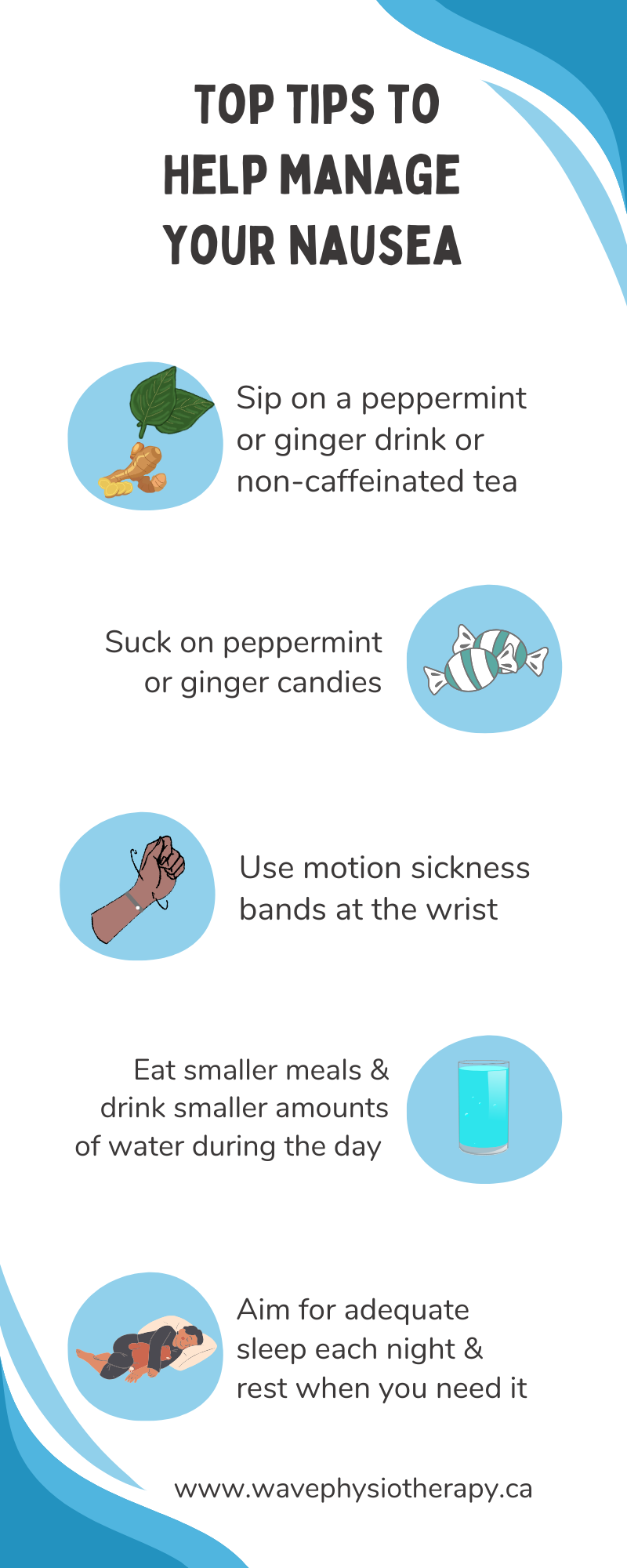Top 5 Tips for Managing Nausea Naturally
Have you been having problems with your vestibular system and experiencing nausea? Have you been wondering how to help nausea naturally?
It’s common for people with vestibular disorders to experience a number of unpleasant feelings, including dizziness, lightheadedness, vertigo, balance issues and nausea. While getting to the root of what’s causing the symptoms is always my goal, many of the conditions that I see as a vestibular physiotherapist take time to improve so having tips on what to do to feel better at home is so important.
In my physiotherapy clinic, one of the questions I hear most often is what can I do to help my nausea? Nausea can significantly limit how much someone can physically do in their day, including eating and drinking enough in the day. Thankfully there are things you can try at home to help manage your nausea and feel more like yourself again.
Here are my top 5 tips for managing nausea naturally:
Drink non-caffeinated peppermint or ginger tea
If you enjoy flavoured beverages, both peppermint and ginger are great options for helping nausea (and being non-caffeinated means this will help your hydration levels too!). Peppermint has a relaxing effect on the gastrointestinal tissue, as well as analgesic and anesthetic effects on the central and peripheral nervous systems (1). Ginger is thought to improve stomach emptying, help with stabilizing blood pressure, and have an anti-inflammatory effect (2,3). If you’re not a fan of hot tea, make one of these into an iced tea and sip on it throughout the day.
Suck on peppermint or ginger candies
Peppermint or ginger candies are a great alternative for people who don’t enjoy drinking a flavoured beverage during the day. These are also easily carried in a pocket or bag for those times when nausea sneaks up on you while you’re not at home making them more accessible than beverages. Personally, I keep ginger candies in my bag so I have fast access to them any time that I need them.
Use motion sickness bands at the wrists
Motion sickness bands (aka sea bands) are one of my personal favourites for nausea management. They’re easy to use, comfortable to wear for long periods of time, and can be easily put on and taken off as they’re needed. They’re easily slipped into a pocket and super lightweight, making them super portable too. I often wear motion sickness bands at times I know I’ve experienced nausea before (i.e. as a passenger in a car, boat, or plane) as a way to minimize or even help prevent an episode of nausea.
Drink smaller amounts of water regularly and eat smaller meals
Staying well hydrated and fuelling your body are so incredibly important when you’re not feeling your best. Introducing smaller amounts of water and food to your stomach more often in your day when you’re nauseated will help you feel better overall. Whenever possible, it’s best to stay upright for up to an hour after eating and drinking to help minimize nausea or reflux after eating.
Get adequate sleep each night
I know we’ve all heard before that getting sleep is important for our overall health. Did you know that one of the symptoms of not getting adequate sleep is nausea? Nausea and other digestive symptoms when you’re not getting enough sleep can even happen in people without vestibular disorders (4). So trying to get in those much-needed zzz’s is a way to help you start at your very best each day and minimize the effects that lack of sleep may be having on the nausea you’re feeling.
The tips above aren’t the only medication-free nausea management options, but they are what I talk about frequently with the people I see for vestibular rehabilitation at my clinic in Toronto, Ontario. I truly hope you found this a helpful place to start!
Want to know more about what vestibular physiotherapy can do to help with your symptoms? Read more about vestibular therapy, contact me or use the button below to book a free consult call.
Last updated: November 10, 2024
References:
1) McKay DL, Blumberg JB. A review of the bioactivity and potential health benefits of peppermint tea (Mentha piperita L). Phytother Res. 2006;20:619-633. DOI: 10.1002/ptr.1936
2) Giacosa A, Morazzoni P, Bombardelli E, Riva A, Bianchio Porro G, & Rondanelli M. Can nausea and vomiting be treated with ginger extract? Eur Rev Med Pharmacol Sci. 2015 Apr;19(7):1291-6.
3) Lete I, Allué J. The Effectiveness of Ginger in the Prevention of Nausea and Vomiting during Pregnancy and Chemotherapy. Integr Med Insights. 2016; 11: 11–17. doi: 10.4137/IMI.S36273
4) Cremonini F, Camilleri M, Zinsmeister AR, Herrick LM, Beebe T, & Talley NJ. Sleep disturbances are linked to both upper and lower gastrointestinal symptoms in the general population. Neurogastroenterol Motil. 2009 Feb; 21(2): 128–135. doi: 10.1111/j.1365-2982.2008.01181.x

